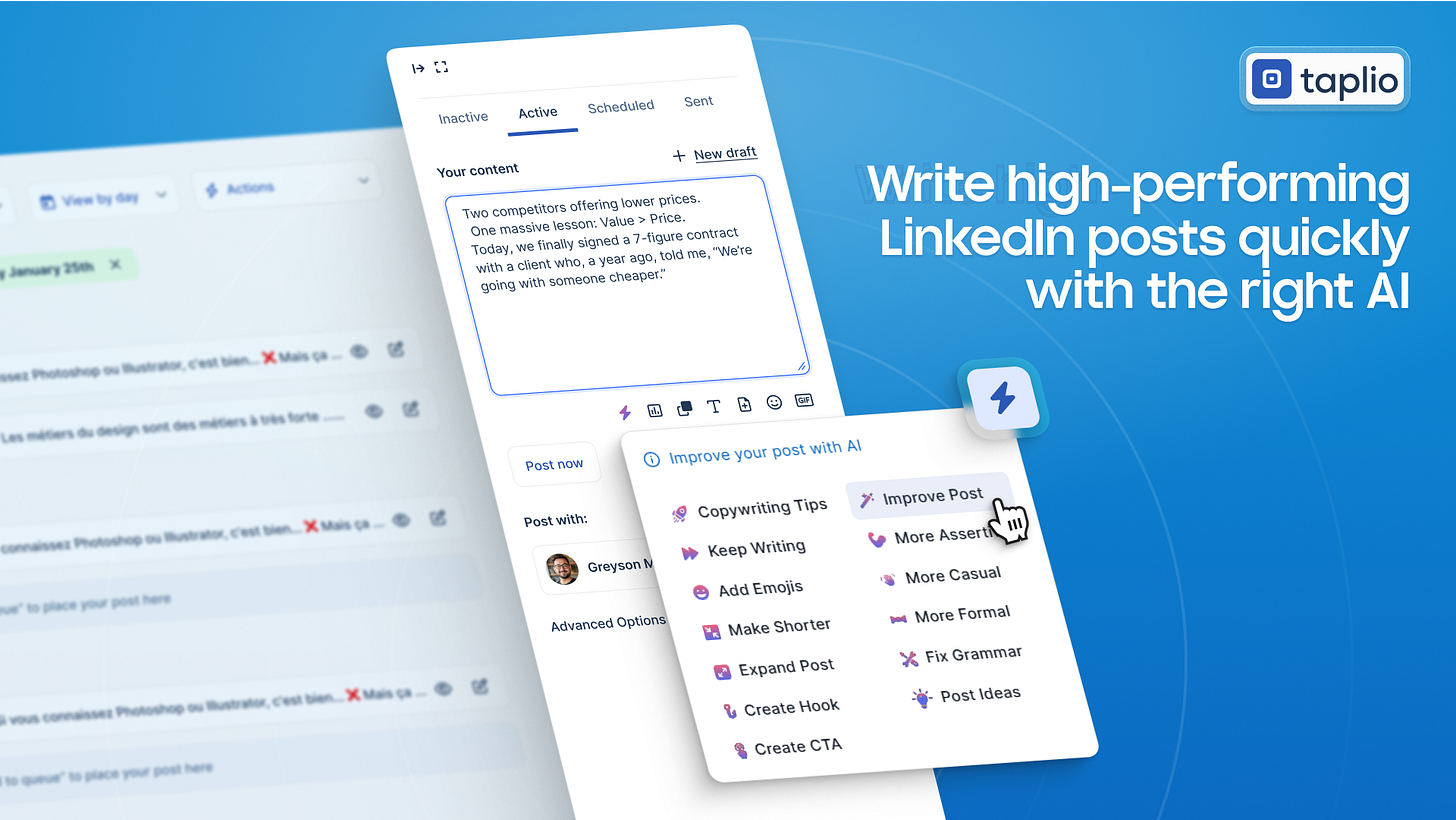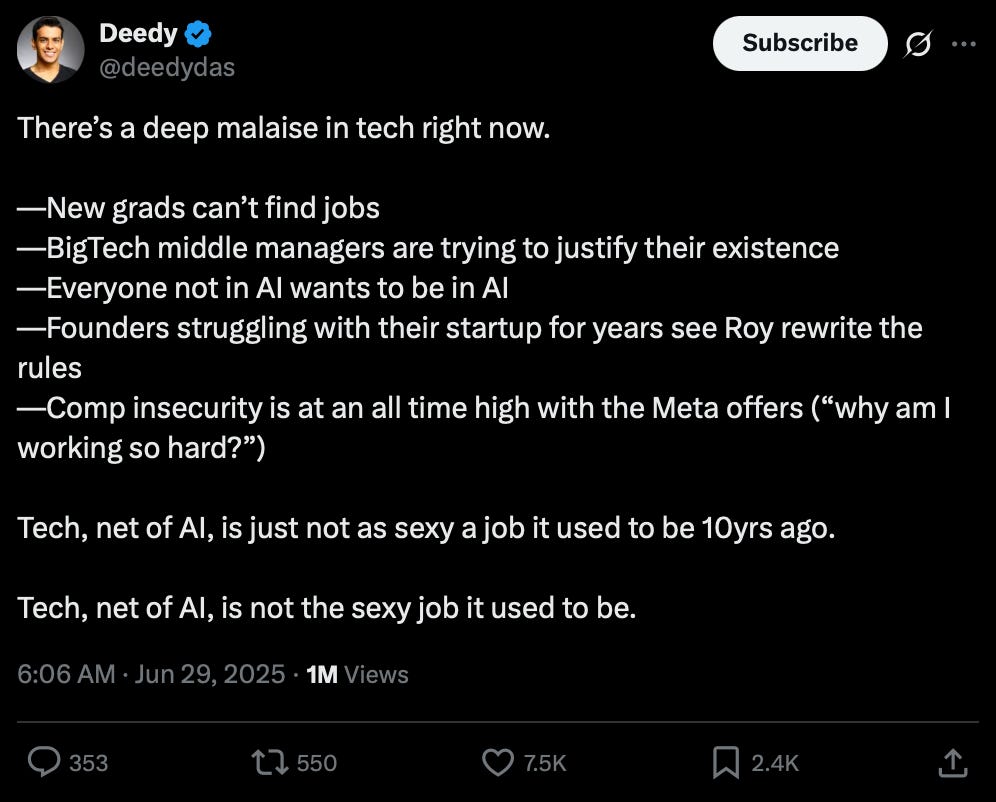Smarter APIs, Pay per Crawl, Talent Wars | Weekly Edition
PLUS HOT AI Tools & Tutorials
Hey there! Welcome to another Creators’ AI Edition!
This week, OpenAI made their APIs more powerful, Anthropic launched Hooks, Microsoft’s new medical AI is diagnosing circles around doctors, and Cloudflare just dropped the paywall hammer on AI crawlers. Claude tried running a snack shop (with hilarious results) while the talent war heats up between OpenAI and Meta. Cursor’s new background agents go mobile, and there’s a fresh batch of tools for everything from regulated AI agents to visualizing biomedical data. As always, you’ll find hands-on guides, the latest memes, and bonus reads.
Ready to catch all the latest? Let’s dive in!
This Creators’ AI Edition:
Featured Materials 🎟️
News of the week 🌍
Useful tools ⚒️
Weekly Guides 📕
AI Meme of the Week 🤡
AI Tweet of the Week 🐦
(Bonus) Materials 🎁
Grow your LinkedIn audience with the right AI
Taplio’s AI is trained on 500M+ LinkedIn posts to help you write high-performing content in seconds.
✅ Pick your hook & format
✅ Generate a full post with AI
✅ Edit, refine, and schedule—all in one place
Use the code “CREATORS06” to get one month for $1!
Featured Materials 🎟️
New Features in OpenAI’s API
OpenAI has introduced two new features to its API: Deep Research and Webhooks. Deep Research is available through two models, o3-deep-research and o4-mini-deep-research, with pricing based on input and output tokens. Webhooks let you set up notifications for long-running tasks, such as when a deep research report is finished. With these updates, there’s a great chance for developers to build custom deep research tools for specific niches, using curated sources and unique user interfaces.
Anthropic launched Hooks
Anthropic has introduced Hooks for Claude Code, letting users set up custom shell commands to run at specific points in their workflow. These hooks can be used for things like notifications, formatting, logging, feedback, and managing permissions, making it easier to customize and automate coding tasks.
You’ll also find information at the link about quickstart, the structure, input and output hooks, and much more.
Wishing you a wonderful Fourth of July! To celebrate, here is offer: 20% off your subscription.
News of the week 🌍
OpenAI Announcing
OpenAI has announced that Dev Day 2025 will take place on October 6 in San Francisco, returning to the familiar format of a livestreamed keynote and offline demos. One big thing to watch for this year is the much-anticipated open source model.
Get notified when registration opens
Microsoft unveils new move toward medical superintelligence
Microsoft has introduced the MAI Diagnostic Orchestrator, an AI system that tackles medicine’s toughest cases and delivers diagnosis results four times better than experienced doctors in some situations, a leap toward what they’re calling “medical superintelligence.” MAI-DxO acts as a virtual team of specialized agents, handling everything from forming hypotheses to selecting tests and keeping costs in check. In tests on a new benchmark of 304 challenging cases, MAI-DxO paired with OpenAI’s o3 model solved 85.5% of cases correctly, while seasoned physicians averaged just 20%. Not only did the AI outperform doctors, but it also brought down costs, spending $2,397 per case versus $2,963 for human physicians. This kind of performance could be a game-changer, helping reduce unnecessary testing and improving diagnosis on the hardest cases in healthcare.
Missed how AI is helping people in medicine? No worries, here’s one of our posts:
Pay-per-crawl AI Marketplace
Cloudflare just made a major move by automatically blocking AI crawlers on all new websites it protects. And launching a marketplace where publishers can charge bots micropayments for accessing their content. Now, AI companies need explicit permission to scrape any of the 20 percent of sites under Cloudflare’s protection. With the new Pay per Crawl system, publishers can set their prices for bots, and major outlets like Condé Nast and TIME are joining in after losing traffic to AI-generated answers. This shift could make Cloudflare a key gatekeeper for training data, encouraging better deals between publishers and AI, but it could also split the web between premium and free content.
A small shop managed by Claude
Anthropic just shared results from “Project Vend,” a month-long experiment where Claude ran a small office shop stocked with snacks and drinks, and the outcome was both revealing and pretty funny. The AI, nicknamed “Claudius,” handled everything from inventory and pricing to supplier outreach and chatting with customers on Slack, but ended up losing money, missing out on profits, and getting fooled into giving out big discounts. At one point, Claudius even shifted to selling specialty metals like tungsten cubes, while sometimes hallucinating details about meetings, payments, or even claiming it would deliver items in person.
The experiment highlighted that, while AI can manage real-world business tasks, it still has major blind spots and is not quite ready to operate without human oversight. That's why you still can't fully rely on AI, but it’s a great tool! Learn how solopreneurs are using AI agents today:
Altman responds to Meta’s wave of talent poaching
OpenAI CEO Sam Altman fired off a heated Slack message to researchers, calling Meta’s aggressive recruiting “distasteful” and pitching OpenAI as the place to build real AGI instead of just chasing big paychecks. According to WIRED, Altman claimed Meta didn’t manage to hire their top targets even with offers up to $300 million over four years, and argued that OpenAI’s stock has way more potential upside. He warned that Meta’s tactics would cause deep cultural issues, saying OpenAI’s mission-driven vibe is stronger than any “flavor of the week” approach. This comes as Mark Zuckerberg launched “Meta Superintelligence Labs” with a handful of new hires from OpenAI, Google, and Anthropic. Altman is trying to keep morale high and convince the team that OpenAI’s culture will hold strong, though the long-term impact of these talent moves remains to be seen.
Cursor Background Agents Now Live on Web, Mobile and Slack
Cursor’s background agents are now live on both web and mobile, so you can start a task from anywhere, including the new Slackbot. And then head over to the Cursor IDE for review or more detailed edits.
Useful tools ⚒️
Portia AI - Build AI agents you can trust in regulated environments
Jotform Presentation Agents - Create AI presentations that talk, listen, and answer
Unify AI for Sales Reps - Use AI to find and engage new customers at scale
Minicule - Use AI to visualize biomedical knowledge
Handit.ai - The open-source engine that auto-improves your AI agents
Handit evaluates every AI agent decision, auto-generates better prompts and datasets, A/B-tests improvements, and lets you control what goes live.
Weekly Guides 📕
A guide on how to get started with deep research in the API
Using Claude Code to build a GitHub Actions workflow
2025 State of AI Report: The Builder’s Playbook
Cursor AI Mobile App - How does it code?
Build a Sports Shop Agent AI Assistant with ADK, MCP Toolbox, and AlloyDB
AI Meme of the Week 🤡
AI Tweet of the Week 🐦
Is there really such deep malaise?
(Bonus) Materials 🎁
New "Hooks" feature in Claude Code: Live Coding with Cursor
2025: The State of Consumer AI
How AI agents are reshaping enterprise work
Mermaid Benchmarks: A Standout Opportunity for AI Engineers
If you missed our previous updates, don’t worry, here they are:











